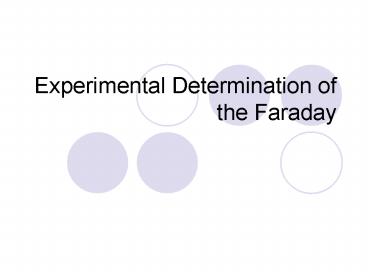Experimental Determination of the Faraday - PowerPoint PPT Presentation
1 / 18
Title:
Experimental Determination of the Faraday
Description:
Procedure Details. Repeat Procedure. Clean-up and begin Check-out Procedure. Refer to Handout. Complete Data Analysis while waiting for instructor check-out ... – PowerPoint PPT presentation
Number of Views:22
Avg rating:3.0/5.0
Title: Experimental Determination of the Faraday
1
Experimental Determination of the Faraday
2
Experimental Objective
- Determine the value of the Faraday (charge on one
mole of electrons) - Determine the molar mass of Cu
3
Procedure Overview
- Copper oxidized by acid (Electrolysis)
- Cu(s) 2H(aq) ? Cu2(aq) H2(g)
- Not spontaneous
- External electrical force applied
- Product hydrogen gas collected
- Pressure, volume and temperature of collected gas
determined. - Magnitude and duration of current measured.
4
Electrolysis of Cu by Acid
- Cu(s) 2H(aq) ? Cu2(aq) H2(g)
- Anode Cu(s) ? Cu2(aq) 2e-
- Cathode 2H 2e- ? H2(g)
Electron flow from anode to cathode External
source of electrons removes electrons from anode
which becomes positive () forces electrons to
cathode which become negative (-) Note In a
spontaneous electrochemical cell the anode is (-)
and the cathode is () and electrons
spontaneously flow from (-) to ()
5
Procedure DetailsPrepare Cu electrode (anode)
- Work in Pairs
- Obtain copper sheet sample
- Clean copper electrode
- Sand
- Rinse
- DRY
- Record mass of copper electrode
6
Procedure DetailsPrepare Gas Buret for gas
collection
- Fill largest beaker slightly more than 1/2 full
of water - Add 3M sulfuric acid to beaker
- Completely fill buret with dilute sulfuric acid
solution. No air! - Invert and submerge in beaker.
- Wash hands after submersion in dilute acid.
7
Procedure DetailConnect External Force
- Labworks
- Page 163 of lab manual
- Use clean cathode
- Make good connections
- Position electrodes close together
- Obtain instructor approval
8
Procedure DetailsOxidize the Cu and collect the
H2
- Apply external force (page 164)
- Collect minimum of 40 mL hydrogen gas
9
Procedure DetailsRecord Data
- Record the temperature of the water -thermometer
- Record the atmospheric pressure provided by
instructor - Record the volume of gas collected gas buret
- Record the height of the column of water
remaining in the buret above the water surface in
the beaker meter stick
10
Procedure DetailRecord Data from Labworks
- See page 164
- Total time of applied current
- Average magnitude of current
- Ohms Law current voltage/resistance
- amps V/ohm
- Resistance used 1 ohm
11
Procedure Details
- Repeat Procedure
- Clean-up and begin Check-out Procedure
- Refer to Handout
- Complete Data Analysis while waiting for
instructor check-out
12
Waste Handling
- Dispose of liquid waste in supplied liquid waste
container - Be careful to not overflow the waste container
13
Data AnalysisPressure of Gas collected
14
Data AnalysisMoles of Gas collected
Pressure of collected hydrogen
gas, atm (calculated) (Phdyrogen gas,
mm Hg)(1 atm/760 mm Hg) Volume
of collected hydrogen gas (buret reading) T
Temperature in degrees K (read from thermometer
and converted) R Gas Constant 0.0821
L-atm/mole-K
15
Data Analysis FaradayCharge on one mole of
electrons
16
Data AnalysisMolar mass of Cu From Charged
Transferred
- Moles of Cu reacted
- Molar Mass mass to mole ratio
17
Data AnalysisMolar mass of Cu From Hydrogen Gas
Collected
- Moles of Cu reacted Moles of H2 collected
- Molar Mass mass to mole ratio
18
Final Exam
- Date Tuesday May 3
- Time 800 AM
- Location Consult Instructor
- Please note that due to the large number of
students involved in this exam the above time is
the ONLY time the exam will be given. You MUST
be present on 5/3 at 800 AM.































